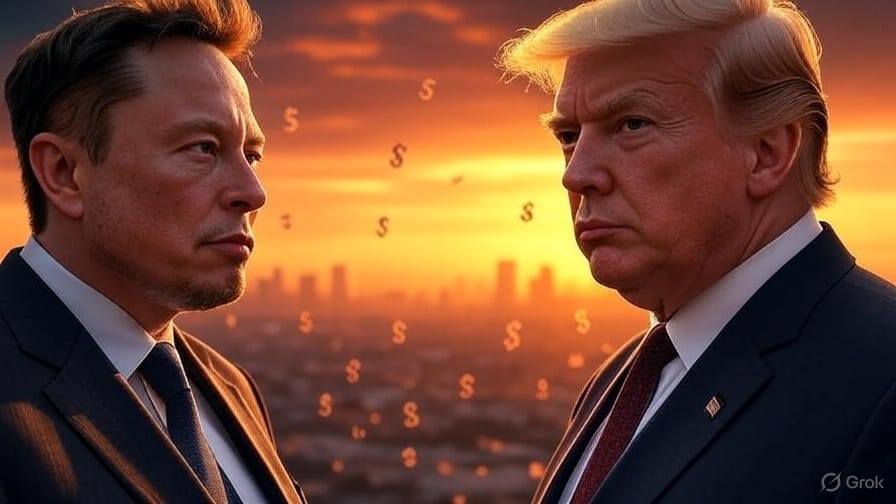- Shortlysts
- Posts
- When Titans Clash: Elon Musk’s Fury Over Trump’s Tax Bill
When Titans Clash: Elon Musk’s Fury Over Trump’s Tax Bill
Elon Musk publicly slammed Trump’s tax bill over reckless spending. The clash highlights the danger of growing debt inflation and its impact on everyday Americans.

What Happened
Elon Musk, the former head of DOGE, publicly blasted President Trump's 'Big, Beautiful, Bill. Musk called the legislation 'disgusting' and an 'abomination' due to its massive spending increases.
The rhetoric between the two figures was shocking, considering Musk was an open supporter of Trump during his 2024 campaign. He also went on to head the newly formed Department of Government Efficiency.
Musk, a billionaire entrepreneur known for pushing innovation and fiscal conservatism, took aim at what he sees as reckless government spending hidden in the tax bill. Trump’s bill aims to deliver political wins through increased funding in certain areas. But it has sparked concern over swelling deficits and unchecked federal debt.
The public spat reveals a deeper tension between principled fiscal discipline and political expediency.
Why It Matters
Musk’s harsh critique stresses a long-standing worry among fiscal hawks. They worry that short-term political gains are driving lawmakers to ignore the long-term consequences of ballooning spending.
When government spending grows faster than the economy, it forces borrowing that piles onto the national debt. That debt eventually must be repaid, often through higher taxes or reduced government services down the line. Meanwhile, increased spending can drive inflation, raising costs for everyday Americans.
Trump's bill, while politically popular in some circles and heavily criticized in others, does risk deepening these economic problems. This is the source of Musk's (public) frustrations. This difference in approaches reflects a bigger debate to be had regarding whether policymakers will prioritize sustainable economic policies or favor short-term popularity.
How It Affects Readers
When government debt continues to grow unchecked, it puts pressure on the economy in several different damaging ways.
Inflation is a big one, which erodes the purchasing power of wages and savings. This makes groceries, gas, and other essentials more expensive. Rising inflation hits those on fixed incomes or tight budgets the hardest.
It also drives up interest rates, and higher interest rates don’t just impact Wall Street, they ripple into everyday life by making mortgages, car loans, and credit card debt more expensive. For families trying to buy a home or finance a car, this means higher monthly payments and less disposable income.
Additionally, as the government allocates more of its budget to interest payments on debt, there’s less left for essential programs like education, healthcare, and infrastructure. Cuts or stagnation in these areas reduce the quality and availability of services that millions rely on daily, from public schools to roads and hospitals.
Over the long term, a growing debt burden can slow economic growth. Investors may see U.S. debt as riskier, discouraging investment and innovation that create jobs and boost wages. A sluggish economy limits opportunities, making it harder for workers to advance or for young people to enter the workforce.
The economic pressures from debt and inflation are real and measurable, and they affect millions’ ability to build a secure future.